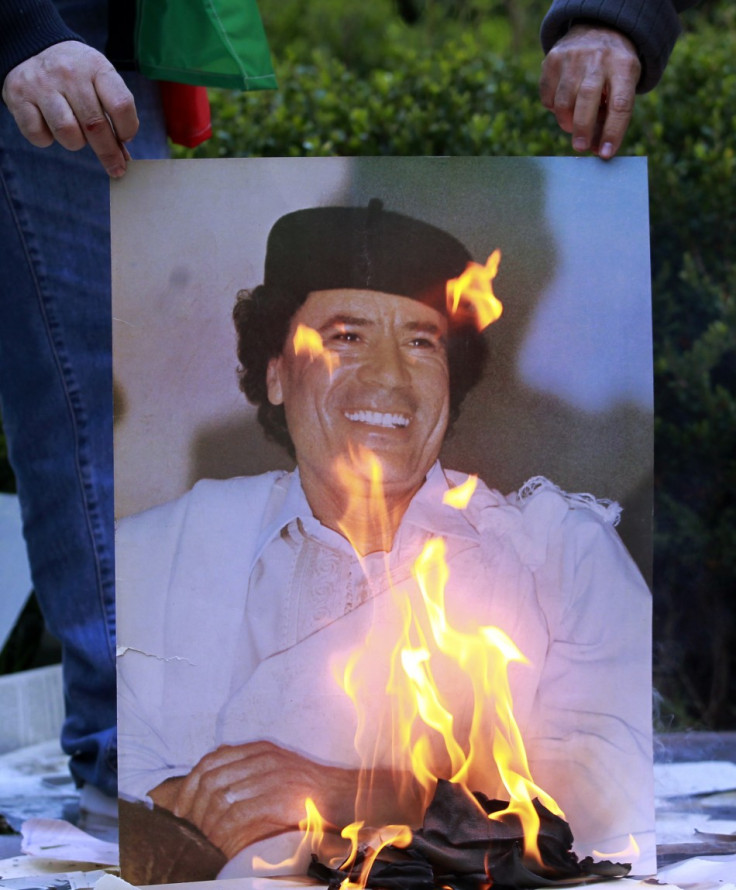Libya: Will Killing Colonel Gaddafi Help International Justice?

Where is Muammar Gaddafi? It is the question of the moment, as two days after the Libyan leader's compound fell in the hands of the rebels, the Colonel is still in hiding.
Since the rebels launched an assault on Tripoli on Sunday evening, Gaddafi has been taunting his enemies with a series of audio messages and an alleged telephone call to a Russian diplomat. Calling for women to take up the fight, saying his forces will clean the capital of the "rats" and insisting he was still able to stroll down the streets of the capital, feeling perfectly secure, the ex-leader has made outrageous if not delusional claims.
The National Transitional Council (NTC), now expected to take control of Libya knows capturing the leader would facilitate its assertion of authority over the country. The next few weeks and months will prove arduous for the new transitional government as the country is still divided on different levels.
Alexis Crow, from the Chatham House Institute in London, told the International Business Times, "as the rebel movement has made considerable military gains in Tripoli, the real question is whether this momentum will feed back to the political centre of the opposition in Benghazi - and hence whether the Benghazi-based TNC can continue to call the shots for a militarily successful rebellion in the East."
The country is currently divided on so many levels that forming a cohesive force will take some time. As Dr Crow also noted, "the NTC will first need to overcome divisions between the Cyrenaica, where Benghazi is the largest city, and the Tripolitania regions."
During the Kingdom era of Libya's history, Benghazi enjoyed a sort of joint-capital status alongside Tripoli , as the King used to reside in the nearby city of Al Bayda' while the Senussi , the royal family were also usually associated with Cyrenaica rather than Tripolitania.
Today Benghazi continues to hold institutions and organizations normally associated with a national capital city, which has created an atmosphere of rivalry with Tripoli.
In addition to overcoming these regional divisions, the NTC will also have to take into account the tribal divisions as well as the political ones.
Moreover, both the rebels and the Gaddafi forces have been accused of having links with Islamist movemenst, which is set to make the aftermath of the conflict even more difficult to handle, Dr Crow explained.
"There is a strong feeling of vengeance on both camps", she added, pointing out that the future stability also depends on whether the Gaddafi loyalists will be successfully incorporated in the transitional phase as risks of insurgencies are still high.
While preparing for the next few weeks however the Council is set on finding Gaddafi and NATO countries have rallied behind the rebels, providing intelligence and reconnaissance support to help Libyan rebels track down Col Muammar Gaddafi, Liam Fox, the UK defence secretary has confirmed.
Two Libyan businessmen supporting the rebels have put a $1.7m (£1m) bounty on Col Gaddafi's head and Mustafa Abdel Jalil, the head of the NTC offered amnesty to "members of Gaddafi's close circle who kill him or capture him."
Meanwhile reports emerged that soldiers from the British elite 22 SAS Regiment were helping rebels track down Col Gaddafi.
According to the Daily Telegraph, the British troops have been dressing in Arab civilian clothing and are armed with the same weapons as locals.
Sources told the newspaper the soldiers had been operating in Libya for several weeks and had joined the hunt for Col Gaddafi on the orders of Prime Minister David Cameron.
While the hunt for Gaddafi is accelerating, the feeling of vengeance is very different from the one of justice. There is a difference between calling for dictators to step down and calling for them to be killed. NATO and the coalition countries have put a strong emphasis on the need for international justice as one of the reasons behind the Alliance operation, but vengeance has now taken over. Gaddafi needs to be brought to justice and face the consequences of his actions rather than being killed by a movement supported by the West, which may in the end only bolster Islamist feelings in the region, as Gaddafi risks being held by many of his former loyalists as a martyr if he is killed.
© Copyright IBTimes 2024. All rights reserved.





